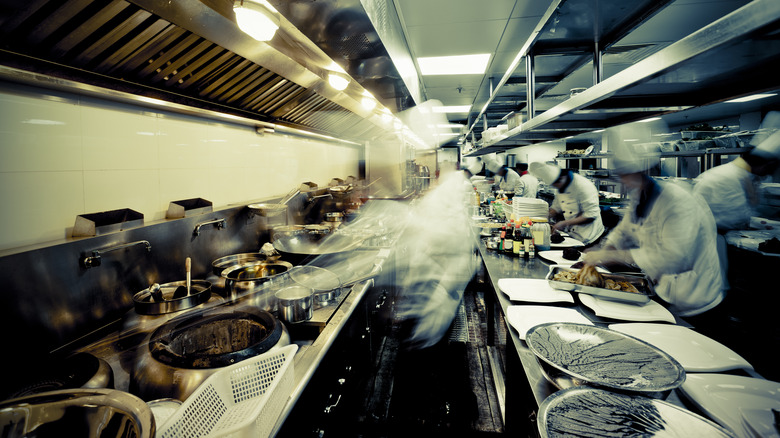What Does Staging Mean In The Restaurant Business?
When Noma, the Copenhagen restaurant from Chef René Redzepi, announced its 2024 closure at the peak of its fame, The New York Times expected the food world to be sent into some sort of disarray — but, for people in the restaurant industry, the news was just another foreseeable misfortune. In fact, for those with experience in the intense, often unsustainable workplace of fine dining, it was more of a surprise that Noma, or any restaurant like it, could manage to remain open for as long as it did. After all, despite receiving three Michelin stars in 2021, along with multiple first-place rankings on the World's 50 Best Restaurants list, the restaurant relied heavily on the unpaid labor of its "stagiaires."
"Stagiaire," as you might have guessed, is the fancy French term restaurants use to refer to kitchen interns and trainees — "staging" is, therefore, the act of those interns working briefly in the kitchen. Like any other internship, the hope here is for the stagiaire to gain experience and exposure to new techniques and cuisines. The expectation is that they'll go on to use everything they learned in a paid kitchen position, whether that's in the kitchen where they are essentially interning, or another one. Of course, none of that experience is paid. But that's not necessarily the issue of any singular restaurant — not even Noma, where diners pay $500 per person. As is the opinion of many, the issue lies in the industry at large.
Rethinking the industry
It's not coincidental that Noma's closure came soon after a decision to start paying interns for the first time. The choice was made after reports surfaced detailing unfair working conditions for Noma's stagiaires, but where the act should have been a step in the right direction, instead it came to highlight the true extent of haute cuisine's issues. As Chef René Redzepi told The New York Times upon his restaurant's closing, "We have to completely rethink the industry." After all, if the best restaurant in the world can't keep its doors open while paying staff a decent wage, what restaurant can?
It's clear some restructuring is in order. Unfortunately, poor working conditions have become so ingrained in restaurant culture that employees don't always believe they can go to their bosses with concerns. The only hope might be customers.
Nicole Philipson Garcia, a chef at Copenhagan's Jatak, told The Financial Times that diners should consider the working practices of the restaurants they eat at — but admitted that could be tough.
"When you're sitting down in that dining room, it's really hard to put two and two together, because you're just out for dinner," she said. "You're just looking to enjoy yourself."
No matter how good the food is, any business that profits while its employees aren't earning anything doesn't deserve your time. Especially considering you could spend your Saturday nights at establishments like the trendy Oakland wine bar DAYTRIP, which celebrate their staff in ways both big and small.

